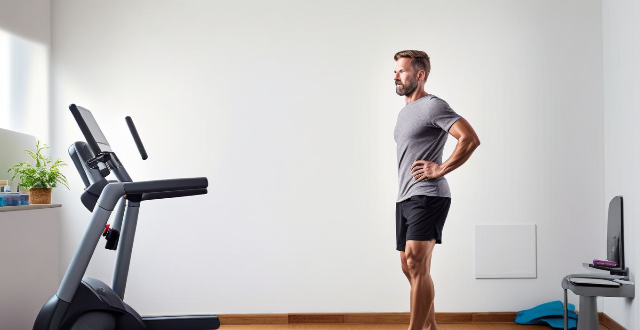Exercise Mental

How does exercise improve mental health ?
The article discusses how exercise improves mental health by reducing symptoms of depression and anxiety, improving mood, and enhancing cognitive function. It highlights the release of endorphins, regulation of neurotransmitters, stress reduction, increased energy levels, better sleep quality, enhanced self-esteem, improved memory and attention, reduced risk of cognitive decline, and promotion of neuroplasticity as mechanisms through which exercise positively impacts mental well-being. The conclusion emphasizes the importance of regular physical activity for overall well-being and advises consulting a healthcare professional before starting any new exercise program.

How does exercise contribute to mental rejuvenation ?
Exercise plays a crucial role in mental rejuvenation by releasing endorphins, improving blood flow, enhancing neuroplasticity, reducing stress, improving sleep quality, facilitating social interaction, and boosting self-esteem. Regular physical activity can significantly contribute to improved cognitive functions, emotional stability, and overall mental well-being.

How much exercise is needed to achieve mental rejuvenation ?
Achieving mental rejuvenation through exercise is a widely discussed topic in recent years, and the benefits of physical activity on mental health are well-documented. However, the question remains: how much exercise is actually needed to achieve these benefits? According to the American Heart Association, adults should aim for at least 150 minutes of moderate-intensity aerobic activity or 75 minutes of vigorous-intensity aerobic activity per week. This can be broken down into 30 minutes of exercise, five days a week. In addition to aerobic activity, it's also recommended that adults engage in muscle-strengthening activities at least two days per week. It's important to listen to your body and adjust your exercise routine accordingly. Practical tips for incorporating exercise into your daily routine include starting small, finding an activity you enjoy, making it a part of your routine, mixing it up, and setting realistic goals. By following these guidelines and tips, you can make exercise a regular part of your life and enjoy the many benefits it brings to both your physical and mental health.

What is the relationship between exercise and mental health ?
Exercise has a profound impact on mental health, enhancingExercise has a profound impact on mental health, enhancing reducing stress, improving sleep quality enhancing mood and cognitive function, reducing stress, improving sleep quality, and fostering social interaction. Regular physical activity stimulates the release of neurotransmitters like endorphins, serotonin, and dopamine, leading to improved mood, relaxation, and better cognitive abilities. It also helps manage cortisol levels, promotes deeper sleep, and provides emotional support through group activities, ultimately contributing to overall mental well-being.

How does physical exercise contribute to mental well-being ?
The text discusses how physical exercise contributes to mental well-being by releasing endorphins, boosting self-esteem, improving sleep quality, facilitating social interaction, and enhancing cognitive function. Regular physical activity can lead to long-term improvements in mental health, including reduced stress, anxiety, and depression, as well as better emotional stability and overall mood. Engaging in group sports or exercise classes provides opportunities for social interaction, which is essential for mental well-being, while achieving fitness goals can boost self-esteem and self-confidence. Better sleep patterns from exercise can lead to improved cognitive function and emotional regulation, while enhanced cognition may aid in the management of mental health conditions. Incorporating regular physical activity into your routine can promote mental well-being through these various mechanisms.

What role does physical exercise play in boosting mental focus ?
Physical exercise is not only beneficial for our physical health, but it also plays a crucial role in enhancing mental focus. Here's how: 1. Release of Endorphins: Regular exercise triggers the release of endorphins, which can help reduce stress and anxiety, leading to improved mental clarity and focus. 2. Increased Blood Flow to the Brain: Engaging in physical activities increases blood flow to the brain, delivering more oxygen and nutrients. This increased blood flow can help improve cognitive function, memory, and overall mental sharpness. 3. Better Sleep Quality: Exercise has been shown to promote better sleep quality and duration. Adequate sleep is essential for maintaining mental focus and concentration throughout the day. 4. Reduction of Stress and Anxiety: Physical activity helps lower levels of the body's stress hormones, such as cortisol. By reducing stress and anxiety, exercise allows individuals to maintain a clearer mind and stay focused on tasks at hand. 5. Enhanced Self-Confidence and Mood: Regular exercise can boost self-esteem and confidence, leading to a positive outlook on life. A positive mindset contributes to better mental focus and productivity. 6. Improved Cognitive Function: Studies have found that regular physical exercise can lead to improvements in various aspects of cognitive function, including attention, memory, and executive functions. These cognitive enhancements directly contribute to increased mental focus and concentration.

How much exercise is needed to see mental health benefits ?
Regular physical activity is known to improve mental health, but the amount of exercise needed varies based on individual factors. The WHO recommends at least 150 minutes of moderate-intensity aerobic activity and muscle-strengthening activities twice a week for adults. Even small amounts of light activity can have mental health benefits, with moderate-intensity activities like brisk walking improving outcomes significantly. Consistency is key, and personalizing your exercise routine based on preferences and capabilities is essential.

Does exercise have a greater impact on mental health than meditation ?
Exercise and meditation are both beneficial for mental health, but it is difficult to determine which has a greater impact. Exercise can reduce stress and anxiety, improve self-esteem and cognitive function, and promote better sleep. Meditation can also reduce stress and anxiety, improve emotional regulation and self-awareness, and promote positive thinking. The effectiveness of each practice may vary depending on individual preferences and circumstances. It is important to choose a practice that suits your needs and engage in it regularly for optimal results.

What are the long-term effects of consistent exercise on mental health ?
Consistent exercise has a multitude of long-term effects on mental health, including improved mood, reduced anxiety and stress, better sleep, increased self-esteem, enhanced cognitive function, and social interaction. These benefits make regular physical activity a powerful tool in maintaining good mental health.

How can older adults benefit from exercise in terms of mental health ?
Exercise is crucial for maintaining and improving mental health in older adults. It enhances mood, reduces depression symptoms, improves cognitive function, manages stress, and provides opportunities for social interaction. Incorporating regular exercise can significantly promote overall well-being in the aging population.

Is there a specific amount of exercise needed per week to see mental health benefits ?
The article discusses the importance of exercise for mental health and explores if there is a specific amount of exercise needed per week to see mental health benefits. It mentions that various health organizations have established guidelines for the recommended amount of exercise per week for adults, focusing on physical health outcomes but also acknowledging the mental health benefits associated with regular exercise. The article suggests that engaging in at least 150 minutes of moderate-intensity exercise per week can lead to significant improvements in mental health, alternatively performing at least 75 minutes of vigorous-intensity exercise per week can also yield positive results. A combination of moderate and vigorous exercises can provide a well-rounded approach to enhancing mental well-being.

Is it necessary to have a gym membership to experience mental rejuvenation through exercise ?
Exercise is beneficial for mental health, but a gym membership isn't necessary. Benefits include reduced stress and anxiety, improved self-esteem, better sleep quality, and enhanced cognitive function. Gym pros: diverse equipment, group classes, personal training, community support. Cons: cost, time constraints, crowdedness. Alternatives: home workouts, outdoor activities, sports clubs, dance classes. The key is finding an enjoyable activity that can be consistently incorporated into one's lifestyle.

Does exercise influence emotional regulation and mental well-being, which in turn affects cognitive processes ?
The article explores the relationship between exercise, emotional regulation, mental well-being, and cognitive processes. It suggests that regular physical activity can positively impact emotional regulation by reducing stress levels, improving self-esteem, and providing a healthy outlet for negative emotions. Exercise also contributes to improved mental well-being by alleviating symptoms of depression and anxiety, promoting relaxation, and providing opportunities for social interaction. These factors, in turn, influence cognitive processes such as attention, memory, problem solving, and decision making. Overall, the article concludes that incorporating exercise into daily routines can have numerous benefits for overall health and well-being.

In what ways does exercise improve mental health, potentially reducing the risk of chronic diseases ?
Regular exercise has been found to have numerous mental health benefits, such as boosting mood and reducing stress, improving sleep quality, enhancing cognitive function, promoting social interaction, and boosting self-esteem and body image. Additionally, regular physical activity can potentially reduce the risk of chronic diseases like cardiovascular diseases, diabetes, and obesity. Incorporating exercise into your daily routine can improve both physical and mental well-being.

Are there specific exercises that help improve mental health ?
Exercises like yoga, meditation, aerobic exercise, resistance training, MBSR, and Tai Chi can help improve mental health by reducing stress, anxiety, and depression symptoms while promoting relaxation, self-awareness, and social interaction.

Can exercise help with stress management ?
**Topic:** Can Exercise Help with Stress Management? **Summary:** * **Introduction:** The inevitability of stress and its potential impact on health highlight the importance of effective stress management. Exercise is often touted as a beneficial method for reducing stress. * **Relationship Between Exercise and Stress:** * **Physical Effects:** Exercise triggers endorphins, reduces cortisol levels, and improves sleep quality—all of which contribute to stress reduction. * **Mental Effects:** Enhanced cognitive function, increased self-esteem, and mindfulness techniques associated with exercise can aid in stress management. * **Benefits of Exercise for Stress Management:** * **Physical Benefits:** Improved cardiovascular health, weight management, and pain relief can reduce stress caused by related health issues. * **Mental Benefits:** Exercise can alleviate symptoms of anxiety and depression, improve mood, and increase resilience to stress. * **Practical Tips:** * **Setting Goals:** Start small and choose enjoyable activities to make exercise a sustainable habit. * **Consistency:** Scheduling workouts, finding an accountability partner, and tracking progress can help maintain a regular exercise routine. * **Conclusion:** Exercise is a powerful tool for managing stress, offering both physical and mental benefits. Incorporating it into one's lifestyle can significantly enhance overall well-being and resilience to life's challenges.

What are the best exercises for improving mental health ?
Engaging in regular physical activities is crucial for maintaining good mental health. Some of the best exercises for improving mental health include cardiovascular exercises like running, cycling, and swimming; strength training exercises like weightlifting, resistance bands, and bodyweight exercises; and yoga and meditation practices like Hatha yoga, mindfulness meditation, and Tai Chi. By incorporating these exercises into your routine, you can reduce stress and anxiety levels while also improving overall well-being.

Is there a link between exercise and improved self-esteem ?
This topic summary explores the relationship between exercise and self-esteem, explaining how regular physical activity can boost mental health and improve one's perception of their own worth. It discusses the types of exercise, their benefits on mental health, and evidence from research supporting the positive correlation between exercise and self-esteem. The conclusion emphasizes the importance of incorporating exercise into one's routine to enhance self-esteem.

Is there a difference in mental health benefits between individual and group exercises ?
Exercise plays a vital role in maintaining good mental health, with both individual and group exercises offering unique benefits. Individual exercises provide flexibility, focus, and personal challenge, while group exercises offer social support, motivation, and accountability. Both types of exercise have been shown to reduce stress, anxiety, and depression while improving mood, self-esteem, and cognitive function. Ultimately, finding an activity that you enjoy and can consistently incorporate into your lifestyle is key to maintaining good mental health through exercise.

Can exercise be a substitute for medication in treating some forms of emotional distress ?
This article explores the potential benefits of exercise in treating emotional distress, such as anxiety and depression, and discusses whether it can be a substitute for medication. While exercise has numerous benefits for mental health, including stress reduction and improved sleep quality, it may not be suitable for everyone or replace medication in all cases. Factors such as symptom severity and individual differences should be considered when determining the best approach to managing emotional distress. Exercise should be viewed as part of a comprehensive treatment plan that includes medical care, therapy, and lifestyle changes tailored to the individual's needs.

Does the timing of exercise (morning vs. evening) affect its impact on mental health ?
The timing of exercise can have a significant impact on its effects on mental health. Morning exercise boosts mood, energy, and productivity, while evening exercise reduces stress and promotes relaxation. However, morning exercise may be difficult to stick to for some people and can cause fatigue later in the day. Evening exercise may interfere with sleep and be less consistent due to unforeseen events. Ultimately, the best time to exercise depends on individual preferences and lifestyle factors.

Can regular physical activity improve mental health ?
Regular physical activity can improve mental health by reducing the risk of depression and anxiety, enhancing self-esteem and cognitive function, improving sleep quality, and reducing stress. Practical recommendations for incorporating exercise into daily routines include starting small, finding enjoyable activities, setting realistic goals, making it social, incorporating strength training, staying consistent, listening to your body, and consulting with professionals.

How can educational psychology aid in addressing students' mental health issues ?
Educational psychology can aid in addressing students' mental health issues by understanding the role of emotional intelligence, promoting a positive school climate, providing early intervention and support services, encouraging self-care and resilience, and facilitating collaboration between educators and mental health professionals.

How do celebrities manage their mental health amidst hectic schedules ?
Managing mental health is crucial for celebrities with hectic schedules, and they employ various strategies to maintain their well-being. These include prioritizing self-care through exercise, healthy eating, and sleep; seeking professional help when needed; setting boundaries to avoid burnout; building a support system of friends, family, and colleagues; engaging in hobbies and interests for stress relief; and practicing mindfulness and meditation to reduce anxiety. By implementing these strategies, celebrities can maintain good mental health and thrive both personally and professionally.

How do competitive sports impact mental health ?
Competitive sports have a significant impact on mental health, with both positive and negative effects. Positive effects include increased self-esteem and confidence, improved social skills and teamwork, stress reduction and relaxation, and goal setting and achievement. Negative effects include pressure to perform, fear of injury, burnout and overtraining, and unhealthy weight management practices. It is essential for athletes to manage the pressures associated with competition and prioritize their mental and physical health above all else. Seeking support from coaches, teammates, friends, and family members can also help athletes navigate the challenges of competitive sports and maintain good mental health.

What is the relationship between physical activity, mental health, and peace ?
The text discusses the interconnected relationship between physical activity, mental health, and peace. Regular physical activity can reduce anxiety and depression, improve mood, and enhance cognitive function, which in turn fosters emotional stability, clear thinking, and empathy - qualities necessary for maintaining peace. Sports and group activities promote teamwork, respect for others, and community building, contributing to peaceful interactions. Therefore, understanding these connections can lead to conscious choices that improve individual lives and contribute to a more peaceful world.

Is high-intensity interval training (HIIT) more effective for mental health than steady-state cardio ?
This article explores whether high-intensity interval training (HIIT) is more effective for mental health than steady-state cardio. HIIT involves short bursts of intense activity followed by periods of rest or low-intensity activity, while steady-state cardio involves maintaining a consistent level of activity for an extended period. Both types of exercise offer benefits for mental health, such as improved mood, reduced anxiety and stress, increased self-efficacy, relaxation, and social opportunities. However, they may appeal to different individuals based on their preferences and goals. Incorporating both types of exercise into a regular routine can provide the most comprehensive benefits for mental health.

How does yoga combine physical activity with mental relaxation ?
Yoga integrates physical activity and mental relaxation through various practices like asanas, pranayama, dhyana, and dharana. Asanas improve flexibility, strength, and endurance, while vinyasa increases heart rate for cardiovascular exercise. Pranayama techniques enhance lung capacity and stamina. Meditation calms the mind, and concentration practices sharpen focus. Yogic philosophy promotes emotional stability. Mindful movement connects physical practice with mental awareness, synchronized breath reduces strain, and restorative poses allow for deep relaxation. Overall, yoga offers a holistic approach to wellness by harmoniously blending body and mind.

How can schools improve student mental health ?
Improving student mental health is crucial for academic success and overall well-being. Schools can help by creating a supportive environment, implementing mental health programs, providing access to resources, promoting healthy habits, addressing bullying and harassment, offering extracurricular activities, monitoring academic pressure, and encouraging self-care. By implementing these strategies, schools can create an environment that supports the mental health of all students, allowing them to thrive both academically and personally.

Can exercise boost the immune system ?
Exercise can indeed boost the immune system through various mechanisms, including enhanced circulation, reduced inflammation, weight management, stress reduction, improved sleep, increased self-esteem and mental health, microbiome diversity, temperature regulation, prevention of chronic diseases, and social interaction. Regular moderate exercise is generally considered beneficial for the immune system, but it's essential to consult with healthcare professionals to determine the appropriate amount and intensity of exercise for individual needs and circumstances.